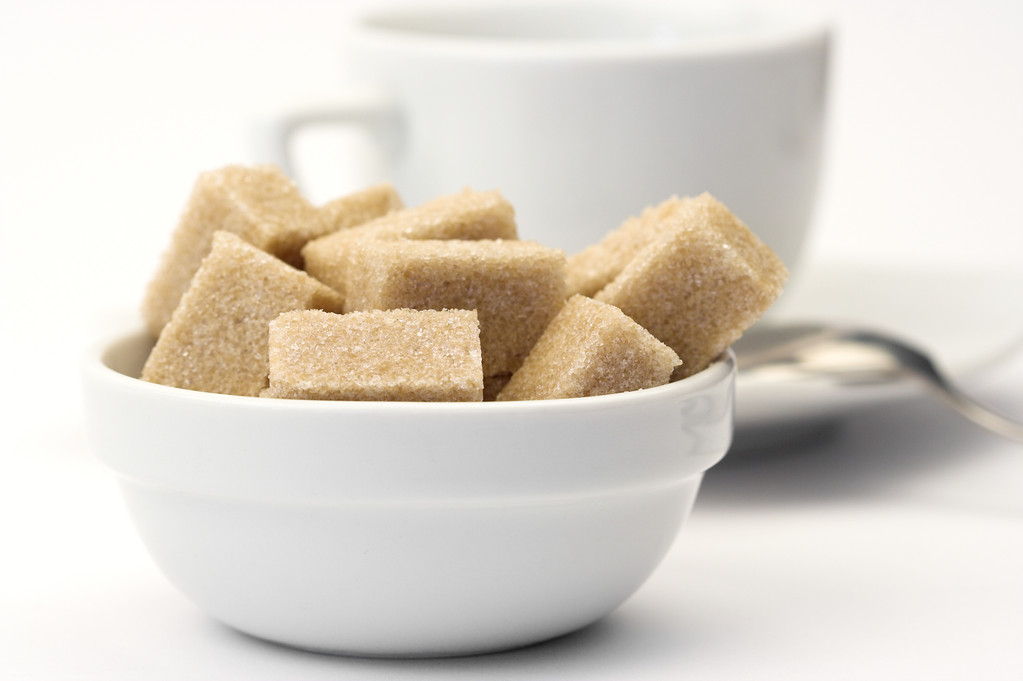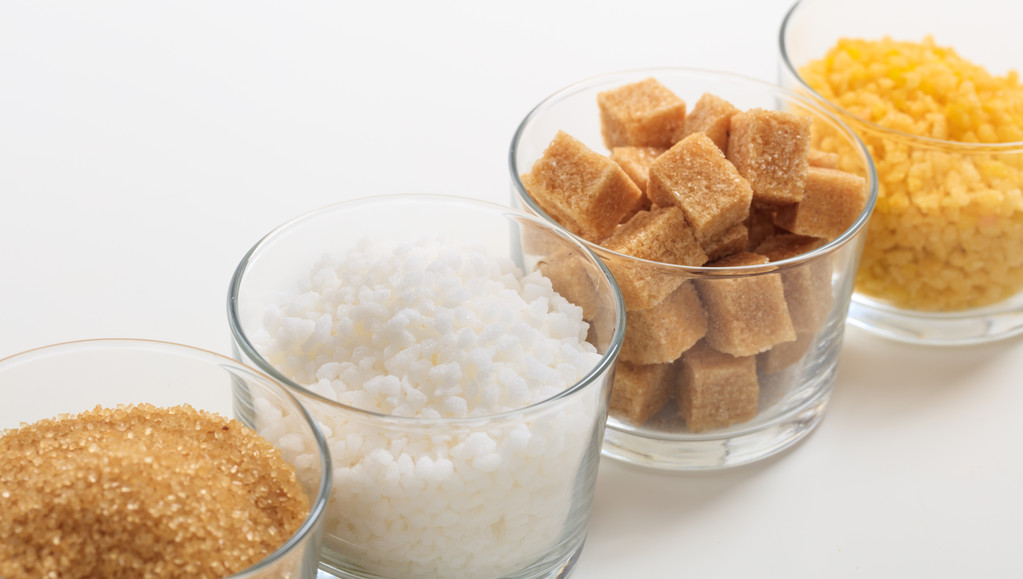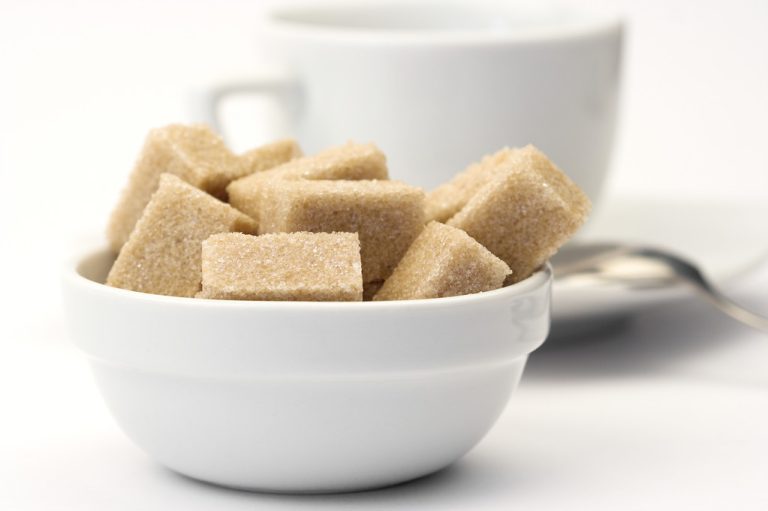Sugar substitutes and sweeteners replace sugar in many products. We explain the differences between the two terms and which substances are behind them.

Sugar substitutes – relatives of sugar
While table sugar (sucrose) contains 400 calories per 100 grams, most sugar substitutes only have 240 calories. However, most of them also have a lower sweetening power than sugar.
Particularly important for diabetics: sugar substitutes are metabolized independently of insulin – they only allow the blood sugar level to rise minimally.
Sugar causes tooth decay, it has a cariogenic effect. Sugar substitutes have little to no such effect.
As the name suggests, sugar substitutes can replace sugar in most products. Although they may have to be dosed higher, they otherwise behave very similarly.
Both sugar and sugar substitutes occur naturally in many plants. In the human body, sugar alcohols such as sorbitol are part of carbohydrate metabolism.
From erythritol to xylitol: Approved sugar substitutes
According to the consumer advice center, eight sugar substitutes are currently approved in the EU:
Xylitol (E 967): Also known as birch sugar, it is the only sugar substitute that has the same sweetening power as sugar and is effective against tooth decay.
Erythritol (E 968): The only sugar alcohol that has no calories.
Sorbitol (E 420): Often used as a humectant and bulking agent.
Mannitol (E 421)
Isomalt (E 953)
Lactitol (E 966)
Maltitol (E 965)
Polyglycitol syrup (E 964)
Note: Since 2014, according to the consumer advice center, products with sugar substitutes no longer have to state whether they are sugar substitutes or sweeteners. The indication “sweetener” is sufficient. However, the list of ingredients must contain the name or the E number of the substance used.
Why might it be interesting to know what kind of sugar substitute it is? Chemically speaking, sweeteners are very different from sugar substitutes.
Sweeteners: No carbs, but sweet
Unlike sugar substitutes, sweeteners are not closely related to sugar. The group of sweeteners includes very different and chemically complex substances. They have in common that they contain hardly any calories and, above all, have a much greater sweetening power than sugar. Stevia, for example, is 300 times sweeter than table sugar. That’s why, unlike sugar substitutes, you can’t just use sweeteners as sugar substitutes in baking.
Sugar substitutes: harmless to health?
According to the Federal Institute for Risk Assessment (BfR), sugar substitutes may be used in food indefinitely. The EU does not have an “acceptable daily intake” (ADI) – i.e. no limit value for a tolerable maximum for the daily intake.
The only caveat: Sugar substitutes can cause bloating, diarrhea, and stomach pain because they’re difficult to digest. For this reason, products containing more than ten percent of a sugar substitute must bear the following notice: “Excessive consumption can have a laxative effect”. According to the Deutsche Apothekerzeitung, erythritol and xylitol are the most tolerable.
Otherwise, the European Food Safety Authority (EFSA) considers sugar substitutes to be harmless. In the EU, the institution is responsible, among other things, for checking the approval of additives. Since many ratings are very old (many date back to the 1980s), a new rating process is currently underway. By 2020, the sugar substitutes should also have been re-examined.
Sweeteners: Probably harmless, but only in moderation
There is an ADI (acceptable daily intake) for sweeteners. According to the BfR, scientists determine this in animal experiments: the animals are given enough of a sweetener until their body reacts to it. This dose is usually divided by 100 (a so-called “safety factor”) – this is then the ADI. This value is checked regularly, for example it was reduced for cyclamate in the early 2000s. The last sweetener reviewed by EFSA in 2013 is aspartame.
As the Deutsche Apothekerzeitung reports, high doses of sweeteners in animal experiments sometimes lead to complaints ranging from allergies to cancer. However, there is no evidence that these hazards in the context of ADI also exist in humans.
The EFSA and the BfR consider all sweeteners to be harmless in the specified daily maximum amounts. As already mentioned, however, the last reviews were a few years ago. For example, a year after the last assessment of aspartame, scientists found that the substance can cause changes in the intestinal flora. These in turn cause the blood sugar level to rise – apparently not only in animals but also in humans. Over time, this can lead to diabetes. So are sweeteners like aspartame not that safe after all? In order to clarify the question unequivocally, more meaningful studies are needed.
Important: In any case, according to the BfR, aspartame and aspartame-acesulfame salt are toxic for people suffering from the metabolic disorder phenylketonuria. The phenylalanine in aspartame is problematic. Therefore, products with aspartame must be labeled “contains a source of phenylalanine”.

How recommended are sugar substitutes and sweeteners?
Sugar substitutes are harmless to health, and so are sweeteners in moderation. But are they really recommended as a sugar substitute? According to the DAZ, scientists repeatedly discuss the question of whether sugar substitutes and sweeteners have an appetizing effect or reduce satiety. So far there is no clear answer.
Eating sugar substitutes doesn’t necessarily mean you’re consuming fewer calories. While their calorie density is lower than sugar, you’ll need to use more to get the same sweetening power. Exceptions are xylitol (same sweetening power) and erythritol (no calories).
Another problem is that people tend to eat more of something that doesn’t have sugar in it. Sugar-free foods are considered healthier, so you can theoretically eat more of them. But then you also quickly consume more calories. Sugar substitutes are therefore not ideal for losing weight.
One thing is clear: If you want to lead a life without sugar, neither sugar substitutes nor sweeteners can train you to lose your sweet tooth. You are more likely to achieve this with a permanent change in diet, in which you primarily use the natural sweetening power of fruit and vegetables.

